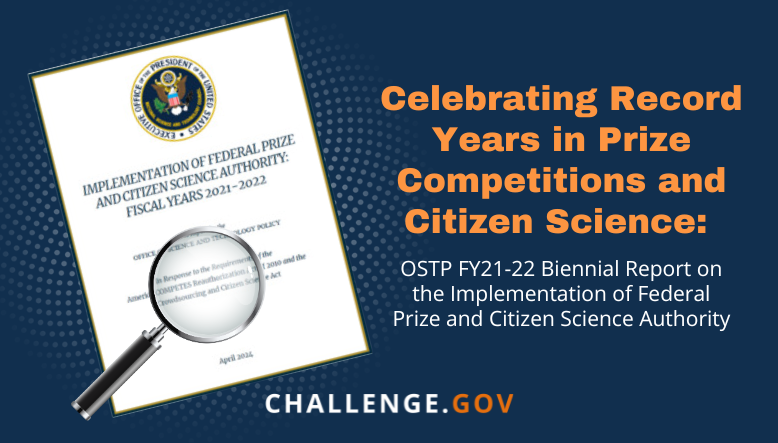
Celebrating Record Years in Prize Competitions and Citizen Science
A summary of the FY21-22 Biennial Report on the Implementation of Federal Prize and Citizen Science Authority
The White House Office of Science and Technology Policy (OSTP) released the biennial report, Implementation of Federal Prize and Citizen Science Authority: Fiscal Years 2021 - 2022. This report highlights how government agencies use prize competitions and challenges (PC&Cs) and crowdsourcing and citizen science (CCS) activities to engage with members of the public to innovate, drive scientific discovery, and solve important problems.The America COMPETES Reauthorization Act of 2010 (COMPETES) and the American Innovation and Competitiveness Act (AICA) require OSTP to produce a biennial report to Congress on the activities carried out under these authorities. Reporting on related activities conducted under other authorities is voluntary and also included.
During the FY 21-22 reporting period, 251 PC&Cs and 82 CCS activities were reported to OSTP – the most activities during any previous reporting period. From addressing climate change, to improving health outcomes, to creating new technologies and innovative products, the report demonstrates the breadth of issues addressed through these open innovation activities.
What’s in the Report
This is the eighth report on PC&Cs and the third report on CCS activities in the federal government. Because activities conducted under authorities other than the America COMPETES Act is voluntary, the report is not a comprehensive view of all PC&C or CCS activities across the federal government.
The two surveys used to collect information on PC&c and CCS activities are included in Appendix E. The raw data for the PC&C survey and the CCS survey are available as separate files. The front matter includes an introduction and analysis of PC&Cs and CCS conducted under America COMPETES, the Crowdsourcing and Citizen Science Act, and other authorities during fiscal years 2021 and 2022.
A Continuum of Engagement
The report places PC&Cs and CCS activities within a context of a larger continuum of public engagement. The stages of the continuum, from reach out, to consult, to involve, collaborate, and ultimately share leadership demonstrate how different approaches – including PC&Cs and CCS activities – achieve distinct goals. Activities under each stage of the continuum contribute to advancing an agency’s mission and provide opportunities to strengthen the federal government’s relationship with members of the public.
Prize Competitions and Challenges Highlights
“Agencies use PC&Cs to tap into a knowledge base that exists outside of the federal government. Using PC&Cs, agencies can achieve a variety of goals, such as generating innovative ideas, developing or demonstrating technology, building or strengthening a community, and supporting outreach and information dissemination efforts.”
- 13 agencies reported PC&Cs with 251 activities reported.
- Over 87% of survey responses indicate they use PC&Cs to seek innovation and/or technology transfer.
- Average (median) number of submissions reported was 33.
- The total dollar amount of prize purses in FY 21-22 was $194,370,475, an increase over previous reporting periods. The increase was largely driven by four agencies: United States Agency for International Development, Department of Health and Human Services, Department of Energy, and Department of Defense.
- Nearly 70% of respondents indicated they use PC&Cs to engage specific group(s) of people, with education level as the top category for engagement.
- The primary methods for engagement were through partnerships and direct outreach to community groups.
- The majority of responses included “cost-effective or optimal” as a justification for PC&C activity.
Crowdsourcing and Citizen Science Highlights
As described in Appendix B of the report: “CCS activities expand how the government engages with the nation, moving beyond working only with established entities (e.g., universities, private firms, non-governmental organizations) through contracts and grants to a collaborative approach involving broad public participation. Federal projects that use CCS do not solely benefit the U.S. Government; they also have positive impacts on the citizens who participate in them.” These positive impacts include enhancing scientific research and monitoring, providing hands-on STEM learning and increasing STEM literacy, and addressing societal needs. *7 agencies reported CCS activities across 82 projects.
- Nearly 90% of CCS activities include the goal of collection of data or observations.
- Average (median) number of participants reported in CCS activities was 146.
- 81 of 82 CSS activities indicated they made efforts to engage certain group(s) of people with geographic location as the primary focus.
- The primary methods for engagement were partnerships and digital engagement on email lists.
- Over half of CCS activities reported cost-effectiveness as part of their justification for conducting these activities.
What this Report Reveals
The report demonstrates how open innovation initiatives have stimulated innovation and engagement with science and expanded the American public’s participation in prize competitions and citizen science. These mechanisms provide mutual benefits for both federal agencies and the American public. Prize competitions, challenges, crowdsourcing, and citizen science activities offer cost-effective ways for agencies to solve problems, bring new ideas, and engage the public. Members of the public can benefit from participation by winning prizes and recognition, contributing knowledge, and increasing understanding of science and technology. These activities are essential to strengthening the relationship between the government and the public.
Recent challenge managers, please stay tuned later this year for the data call from OSTP to prepare the FY23-24 biennial report.

